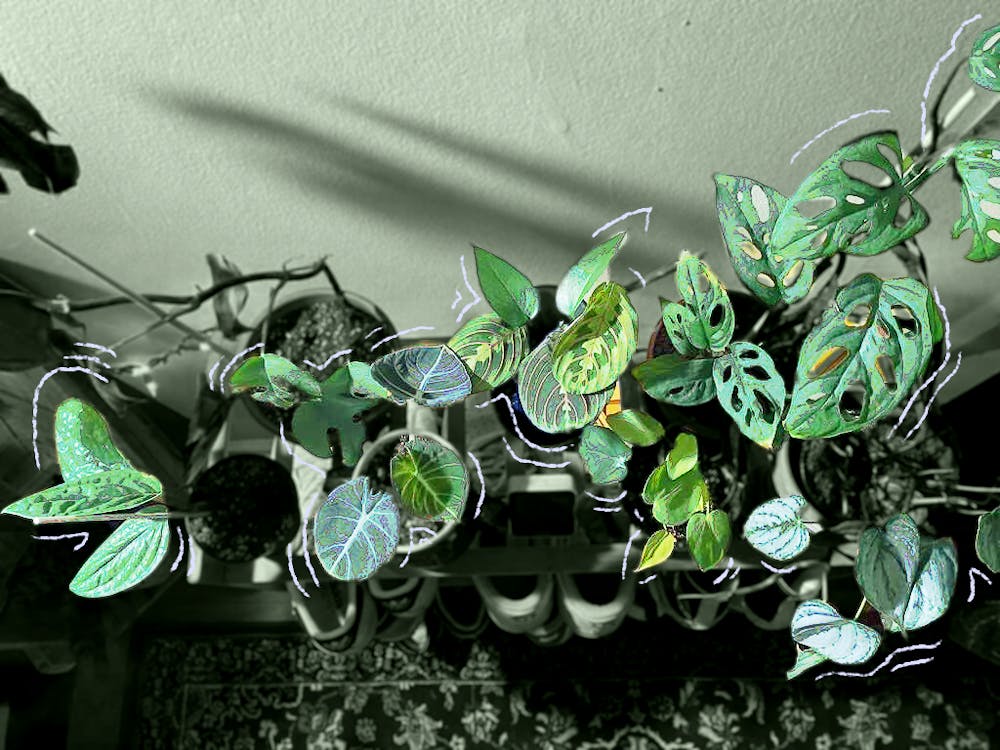I’m hunched over my desk with blue–light glasses on my face, staring at my computer screen for my weekly environmental science recitation. The TA puts us in breakout rooms, and one of my classmates points out my background—an indoor jungle full of luscious foliage and tranquility. “You have, like, a lot of plants,” they remark, in what I assume was an attempt to ease the awkwardness of our virtual ‘turn to your partner and discuss’ task.
I never really thought of my plant collection in a quantitative manner, but hearing those words evoked some self–reflection. This resulted in the conclusion that, for a twentysomething college student, I really do have a lot of plants. In fact, there's 60 of them adorning every inch of my room.
At the beginning of the COVID–19 pandemic, I found myself sulking in my childhood bedroom, unsure of what to do with myself. I was anxious, uneasy, and looking for literally anything to direct some positive energy towards.
After her monthly masked–up trip to the grocery store, my worried mother brought home five little plants in the hopes of cheering me up. As the pandemic continued, I found myself acquiring more plants every once in a while, watching countless videos on YouTube, and becoming electrified at the prospect of growing my own collection. Eventually, houseplants became a non–academic project for me to channel my emotions into—something to focus on when it seemed like impending doom was upon us.
Soon, the five plants my mother gifted me became 60. And I was not the only one. Keeping houseplants is obviously not a new hobby, but when lockdowns halted most pastimes, many people turned to plants instead. Maintaining a collection became a way to cope with living through a pandemic that upended everyday life. After a friend recommended I join Philly Plant Exchange, a local plant hobbyist group on Facebook, the breadth of the hobby became clear to me.
The tightknit community that houseplant hobbyists are graced with is something that most people don’t know about before joining. When the hobby exploded in popularity in mid–2020, so did the strength of this community. I found myself joining multiple Facebook forums for advice and the opportunity to trade and sell plants. Fellow member of Philly Plant Exchange Leonel Lin (C ‘23) explains that “since COVID, plants have been a way to connect with other people in Philly online.”
Member of Philly Plant Exchange and Mid–Atlantic Carnivorous Plant Society (MACPS) President Kevin Zhang (M '24) expresses a similar sentiment. Pre–pandemic, MACPS usually hosted in–person meetups every couple of months; Zhang says these have now become virtual meetings.
“It was disappointing to not be able to see a lot of people I have become friends with through plant societies," he says. "But on the bright side, these virtual meetings [have] allowed me to meet people across the country and world who are into carnivorous plants.”
The community's generosity and warmness is something I'm so grateful for. Plant hobbyists are a group of people with different backgrounds all excited about the same thing, and we're willing to do almost anything to ensure everyone feels welcome.
“I have seen such kindness and generosity in the houseplant hobbyist community,” says Victoria Scrima, a Philadelphia resident and member of Philly Plant Exchange. She notes that many plant shops have given away free cuttings and worked to make rarer, more expensive species more affordable and accessible.
The community has made me feel seen in a time of emotional hardship and overall instability. Members share photos of their collections, consult each other for tips, and encourage a safe, transparent atmosphere. Many plant–lovers lean a little harder on their indoor jungles for joy and contentment when life is especially difficult. Scrima says that after a difficult breakup, she found herself purchasing “just a few plants over and over for comfort.”
“They brought me a lot of joy, as there is a sweetness to seeing life thrive under your care,” she says.
Now, during the pandemic, hobbyists' relationships with their plants have changed. Sarah Santucci (M '21) says that the pandemic has provided her with more time at home with her plants, though she admits she misses being able to go to in–person meetings for MACPS.
In some cases, hobbyists like Scrima have started earning an income from houseplants. "More recently, as I’ve rounded out my collection, developed an education in houseplants, and increased my propagation skills, I’ve begun to sell plants, which brings in some income," she says. I've also witnessed many people selling rarer species in Facebook forums to cope with the financial burden of the pandemic.
Though the houseplant hobbyist community is generally strong, some members have concerns about its rising popularity. Santucci explained that though the growth in the hobby excites her, she worries about plant 'trends' where certain species become trendy and prices skyrocket. “Sometimes inexperienced hobbyists, lured by the trend, buy these plants for overinflated prices,” she says. “A resulting impression that the houseplant hobby is expensive and unstable could be discouraging for potential new hobbyists.”
Scrima also worries about the lack of recognition that, for some people, houseplants are a source of income. “I wish there was more acceptance for those who have put a lot of work into being able to make some income off of this shared passion,” she says.
Despite this concern, she notes that the overall outlook for the hobby's future is bright. Plants continue to be an important source of comfort for people struggling with being stuck at home.
So the next time you scroll past one of those aesthetically pleasing plant pictures on Instagram, you should consider building a collection for yourself. Keeping plants is more than an aesthetic—it’s a form of therapy. It’s an embodiment of the importance of nature. It’s a platform to build connections—even virtually. And above all, it’s a reminder that now more than ever, we could all stand to appreciate life, even in the simplest of forms.







